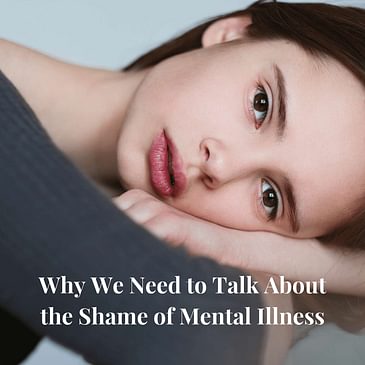Episode Description:
Why We Need to Talk about the Shame of Mental Illness discusses whether or not we should share our mental health conditions and struggles with others, and if so, whom. This episode also discusses the differences between shame and guilt, how trauma is connected to shame and mental illness, and how people cover up and deny shame. We then discuss why you need to tell yourself the shame you feel is not your fault.
Jesus' finished work on the cross defeated shame once and for all. As a result, knowing who you are in Christ heals shame. Speaking about shame with those that we trust, can also heal it. There are solutions to heal shame, if we as a culture can openly address the shame and stigma mental illness.
Breakdown of Episode:
0:00 Intro to the Topic
6:32 Why We Need to Talk About the Shame Around Mental Illness
8:40 The Difference Between Shame and Guilt
14:35 How is Shame Connected to Trauma, Mental Illness, and Suicide, and Why People Cover up and Deny Shame
25:52 Why the Shame You Feel Is Not Your Fault
27:46 How Jesus' Finished Work Heals Your Shame Forever
22:39 How You Can Start to Heal Yourself
33:22 What Does the Presence of Jesus Mean for Shame?
37:57 Vulnerability and Compassion as Keys to Heal Shame
40:05 Solutions to Heal Shame
58:40 What We as a Culture Need to do About the Shame of Mental Illness
Bulleted List of Resources
- "Dealing with Shame When You Have BPD" by Kristalyn Salters-Pedneault
https://www.verywellmind.com/what-is-shame-425328
This article addresses those who have borderline personality disorder, but the differences between shame and guilt given can help anyone who struggles with mental health issues. Shame is debilitation, whereas guilt is a tool that helps us to course correct.
- "Suicide and Shame," The General Psychologist, John C. Minahan
https://www.apadivisions.org/division-1/publications/newsletters/general/2016/10/suicide-shame
This article discusses shame that is associated with suicide and suicide ideation, and how we need to address the root causes of suicide and suicide itself differently. Minahan discusses great people in history that suffered from depressi
Christian Emotional Recovery Resources
Podcast Website
Access Episodes, Get Free Resources, and More
Facebook Group
Join Community, Get Support, and Get Weekly Encouragement
YouTube Channel
Subscribe for Exclusive Material Not on Podcast
Christian Emotional Recovery Store
Get meditations, infographics, journals, and other resources for your healing journey
Trauma Survivors
Check out Resources Page for Trauma Survivors
Email List
Get updates on episodes, platform, resources, and products
Free Resource
Free Visual A.C.O.R.N Resource to Heal Difficult Emotions
Donate Monthly Through Patreon
Help More Trauma Survivors Through This Ministry
Donate One-Time Through Ko-Fi
Help More Trauma Survivors Throu...

